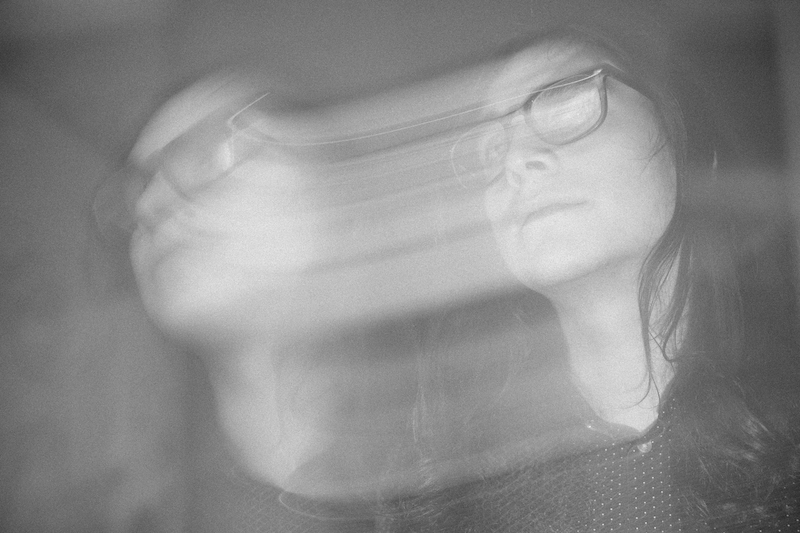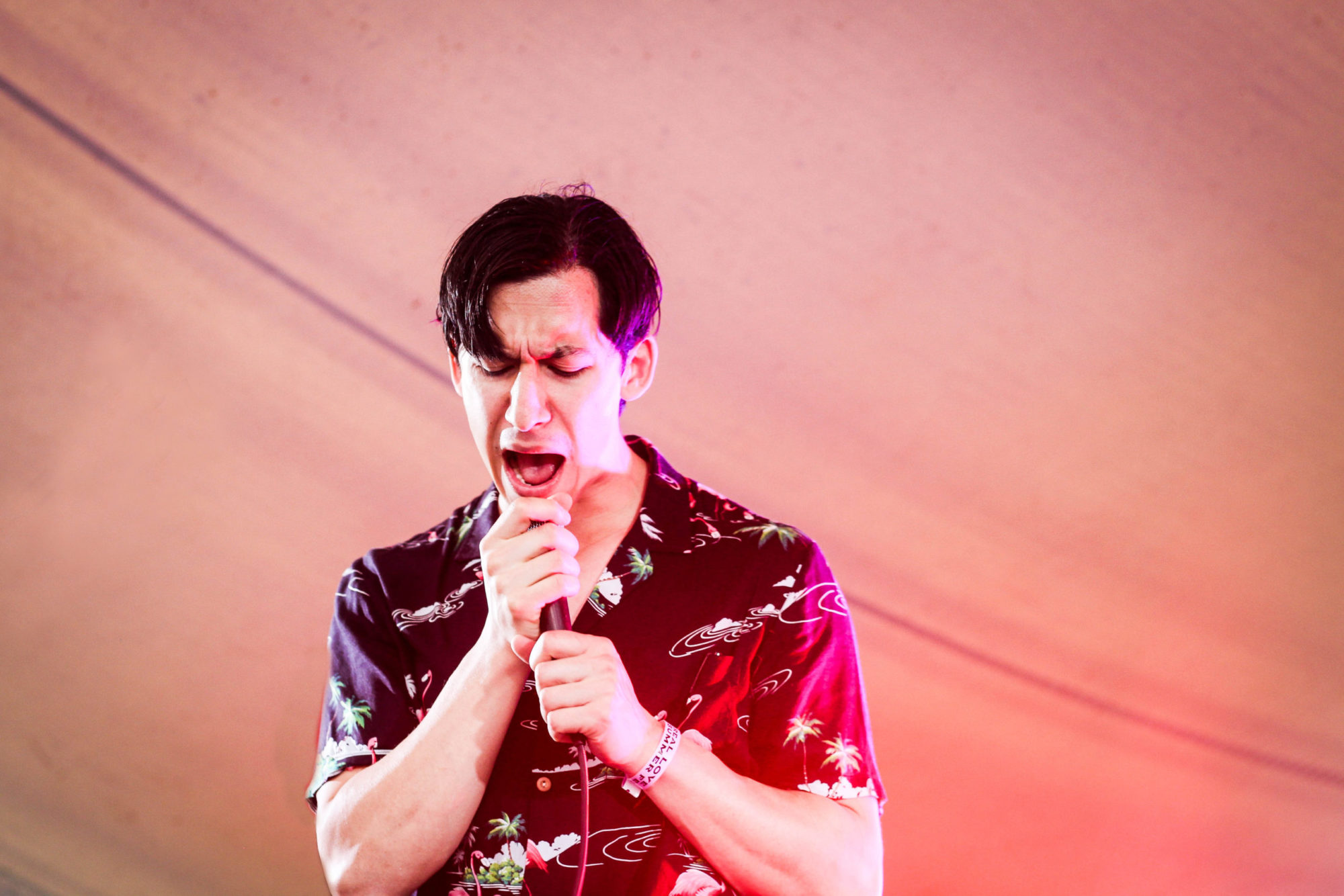
by Myles Tiessen
It’s hard to describe the type of music Zoon makes. Their discography exists beyond any traditional classification and remains acutely unique to them.
The Toronto-based experimental artist cut their teeth with the shoegaze indebted Bleached Wavves, which used overlayed guitars and crashing drums that blended with a whole host of feedback to draw the listener into breathtaking transcendentalism.
As the solo project for Anishinaabe artist Daniel Monkman, Zoon’s follow-up EP, Big Pharma, provides scaled-back and serene, yet similarly gorgeous, songs that float in the musical ether. As the EP’s title explains, the tracks in this collection scrutinize the problematic and often evil structures designed by the pharmaceutical industry. Particularly, Monkman exposes how these systems have targeted and manipulated Indigenous peoples and communities for generations.
On Big Pharma, Monkman draws attention to their family, friends, and hometown of Selkirk, Manitoba. With the breathtaking “Astum,” Monkman employs an approachable unhurried melody and unfiltered acoustic guitars to explore the idea of heritage through the lens of language and trauma. Featuring the astounding Leanne Betasamosake Simpson, the song fits delicately into Zoon’s catalog as one of their most open and honest reflections.
In part, due to the collaborative nature of the EP, Monkman probes new and profoundly inspired sonic spaces. From the instrumental “Red River”—with its cellos, saxophone, and guitar melody assisted by Sunnsetter—to the hypnotic and dreamy “Oil pastel/ Dope sick” featuring Cadence Weapon, Big Pharma is a testament to the powers of collaboration against institutions designed to exploit and destroy.
This interview has been edited for clarity and conciseness.
Stylus: Let’s talk about this EP. How long was the process when putting these songs together? Have these songs been cooking for a while?
Daniel Monkman: No, I actually wrote them in like a month in my home when I moved in a few months ago.
S: Are you always this prolific? Do you usually get home from a tour and write an album worth of music in a month?
DM: Yeah, it’s the thing that helps me with my anxiety. I’ve built a career off of my intellectual property, and now that I know it’s the way for me to pay the bills, as soon as I have some downtime, I start writing and recording. I also have a new studio in my home, so I try to take advantage of it when I can.
S: So then how do you decide what turns into a complete project and what are just notes that are put on the side?
DM: I can usually tell if the song makes me feel a certain way. I think, “Okay, this means something.” Where if I’m slowly chipping away at something, and it’s a tedious process, and I keep hitting roadblocks, then that means the song isn’t ready. Usually, if things aren’t moving, I’m not going to use it.
S: Speaking of your songwriting process, I want to talk about the amount of collaboration on this EP. Based on how DIY Bleached Wavves felt, I was surprised when I saw every song on Big Pharma has a feature. I’m wondering what sort of new role collaboration plays in your songwriting process?
DM: That’s a good question because all the songs on the new EP I wrote and recorded myself and then approached vocalists. In the beginning, I really didn’t know what I was doing, but I heard Kevin Shields (My Bloody Valentine) talk about how he loves doing EPs more than full-length albums because EPs give you space to try out new things. That’s what I was trying to do with this. I want to prepare people for the changes I’m going through as a songwriter. I don’t want it to be a shock when they hear different things in the future.
S: That’s surprising you wrote and recorded it all by yourself because overall, I think it sounds like you’re pushing yourself and venturing into new territory.
DM: Yeah, I’m the type of artist that makes art with what they have. Lately, I’ve bought a bunch of weird electronic instruments and stuff. “Oil pastel/Dope sick” has no guitar at all in the whole song. It’s just an omnichord, a Casio digital guitar, and drum beats that I made.
S: Damn, that’s cool. Okay, let’s get into the themes of this album. What was the catalyst for making an EP about the pharmaceutical industry?
DM: It’s no secret that I’ve had my struggles with relying on self-medicating. In my recovery, I finally woke up and saw the world differently. I started to exercise my treaty rights and decided to seek a doctor and various forms of support that were available for me. And in that search, I just started to uncover a lot of suspicious wording in The Indian Act. It’s like the government and the health industry have done a PR stunt on genocide, and we don’t think of genocide as something that is still ongoing in Canada. When I uncovered some truths about what was available to First Nations people through the treaty, it’s actually very harmful to us in the long run, and not a lot of people are speaking about that. And at the same time, when I wrote this EP, I had an emotional relapse, and I experimented with some drugs. But at the end of it, I was like, “Well, this really sucks, and I hate this,” so when I was detoxing, I started to write about all these things I’ve been thinking about.
S: What about the song “Red River?” It’s a direct reference to Manitoba and is the only instrumental track on this EP, so you’re not able to vocalize your thoughts on that track; how does that fit into all of this?
DM: I grew up beside the Red River in Selkirk, Manitoba my whole life, and there was a time I lived in Winnipeg for several years, so to me, the Red River represents Winnipeg. That’s how I see it. I really thought about that when I was thinking about home and how the pharmaceutical companies devastated my hometown with all the lies about how addictive their pills were. The lies of PR companies caused such devastation to communities, and no one was really held accountable. These pharmaceutical companies sometimes pay their fines, but because they are million-dollar companies, they get away with it.
S: You come into these concepts with a fair bit of skepticism or anger, but your music still sounds so beautiful. Is there something cathartic in all of this, or what way do you use music to process these emotions?
DM: Oh yeah, for sure. Even just writing music helps. A common thing that people will say to me is, “You must be so excited to be on the road playing music.” It’s true, I love playing music, but it’s still very hard for me, and I find writing and recording music is what’s really important to me. That process of when I start with a couple of chords, and by the end, I have a pocket-symphony sounding track; I find so much solitude and happiness. And when the song is done, I can carry that feeling for a little while.

